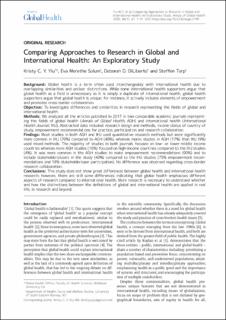| dc.contributor.author | Yiu, Kristy | |
| dc.contributor.author | Solum, Eva Merethe | |
| dc.contributor.author | DiLiberto, Deborah D. | |
| dc.contributor.author | Torp, Steffen | |
| dc.date.accessioned | 2021-04-26T10:39:07Z | |
| dc.date.available | 2021-04-26T10:39:07Z | |
| dc.date.created | 2020-11-25T13:08:52Z | |
| dc.date.issued | 2020 | |
| dc.identifier.citation | Yiu, K. C., Solum, E. M., DiLiberto, D. D., & Torp, S. (2020). Comparing Approaches to Research in Global and International Health: An Exploratory Study. Annals of global health, 86(1), 47. | en_US |
| dc.identifier.issn | 2214-9996 | |
| dc.identifier.uri | https://hdl.handle.net/11250/2739536 | |
| dc.description.abstract | Background: Global health is a term often used interchangeably with international health due to overlapping similarities and unclear distinctions. While some international health supporters argue that global health as a field is unnecessary as it is simply a duplicate of international health, global health supporters argue that global health is unique; for instance, it actively includes elements of empowerment and promotes cross-border collaboration.
Objective: To investigate differences and similarities in research representing the fields of global and international health.
Methods: We analyzed all the articles published in 2017 in two comparable academic journals representing the fields of global health (Annals of Global Health, AGH) and international health (International Health Journal, IHJ). Abstracted data included: research design and methods, income status of country of study, empowerment recommendations for practice, participation and research collaboration.
Findings: Most studies in both AGH and IHJ used quantitative research methods but were significantly more common in IHJ (70%) compared to AGH (48%), whereas mores studies in AGH (17%) than IHJ (9%) used mixed methods. The majority of studies in both journals focused on low- or lower-middle income countries whereas more AGH studies (16%) focused on high-income countries compared to the IHJ studies (4%). It was more common in the AGH studies to make empowerment recommendations (90%) and to include stakeholders/users in the study (40%) compared to the IHJ studies (75% empowerment recommendations and 18% stakeholder/user participation). No difference was observed regarding cross-border research collaboration.
Conclusions: This study does not show great differences between global health and international health research; however, there are still some differences indicating that global health emphasises different aspects of research compared to international health. More research is necessary to understand whether and how the distinctions between the definitions of global and international health are applied in real life, in research and beyond. | en_US |
| dc.language.iso | eng | en_US |
| dc.rights | Navngivelse 4.0 Internasjonal | * |
| dc.rights.uri | http://creativecommons.org/licenses/by/4.0/deed.no | * |
| dc.title | Comparing Approaches to Research in Global and International Health: An Exploratory Study | en_US |
| dc.type | Peer reviewed | en_US |
| dc.type | Journal article | en_US |
| dc.description.version | publishedVersion | en_US |
| dc.rights.holder | © 2020 The Author(s). | en_US |
| dc.source.volume | 86 | en_US |
| dc.source.journal | Annals of Global Health | en_US |
| dc.source.issue | 1 | en_US |
| dc.identifier.doi | https://doi.org/10.5334/aogh.2799 | |
| dc.identifier.cristin | 1852210 | |
| dc.source.articlenumber | 47 | en_US |
| cristin.ispublished | true | |
| cristin.fulltext | original | |
| cristin.qualitycode | 1 | |

